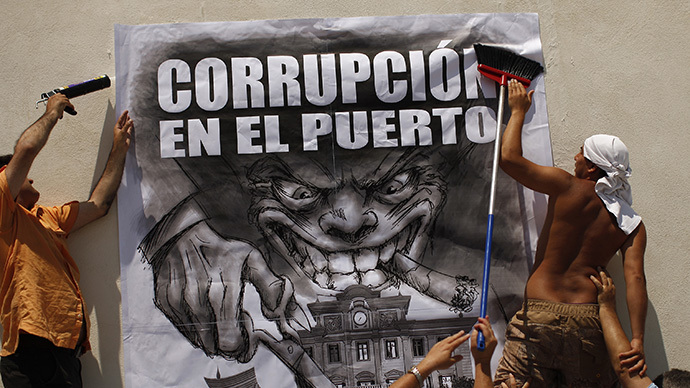Corruption in EU: ‘Ball in the court of individual member-states’

The European Commission has made it clear national governments have to deal better with the issues of foreign bribery and regulating conflicts of interests, Carl Dolan the EU director of Transparency International, told RT.
The EU has issued an Anti-Corruption Report, which examines all 28 member countries and looks into existing measures, problems and successful policies to provide further recommendations. According to the report, the scale of corruption in the EU is tremendous since it costs the economy 120 billion euro per year, which is equivalent to the EU’s annual budget.
RT:The term is very broad. What form does this corruption take? Who's getting what from whom?
Carl Dolan: Corruption takes many different forms across Europe. Different countries have very different corruption risks, very different profiles in terms of the problem of corruption. For example, in many of the new EU member-states there is still a lot of petty corruption, that citizens are paying small bribes for access to basic services like health care. But in other countries the main corruption risk is to do with political corruption, that’s a kind of conflict of interests in dealings that politicians have with business.
RT:Your organization has warned of serious corruption in the EU for years. Do you expect any action, following this report?
CD: The European Commission has made it clear that the ball is now firmly in the court of individual member-states, that’s the national governments. They have to come through and deal with issues of foreign bribery, regulating conflicts of interests better. But there is of course a role for the European Commission as well, and the Commission has been largely silent on that, saying “We will release another report in two years’ time.” The Commission could do more in the area, for example, regulating conflicts of interests in public procurement or in whistleblower protection legislation.
RT:Why did the report omit findings of corruption in EU institutions? What have they got to hide?
CD: The Commission says that self-assessment would not be credible. We don’t think that’s the case. We think any government should have capacity to assess corruption risks in its own institutions. The EU Ombudsman has recently come out and agreed with us, that it should be a chapter in the next anti-corruption report on EU institutions. Luckily, Transparency International is conducting its own assessment of integrity problems, integrity risks in EU institutions and will be publishing it shortly.
RT:You hint that you want Brussels to coordinate the anti-corruption effort. Do you propose delegating the EU even more authority over member-nations?
CD: No, it’s not a question of more authority, it’s about using the power and competencies that it already has, it’s about softer initiatives, using peer pressure and putting countries in the spotlight to make sure the momentum for reform is maintained. To some extent they have done that with this report. But it’s not about new powers for the European Union, it’s about using powers that they already have more effectively.
RT:How can it be effective when Brussels, the body expected to stamp it out, censors and hides from the public the corruption happening inside of it?
CD: In many ways it’s just about putting together a comprehensive strategy because the Commission deals with corruption in different ways, part of it relates to internal security and a fight against organized crime and anti-money laundering, one part of the Commission deals with that. The Commission is also responsible for trade matters, which is trading customs and is also an area which is known for corruption problems. And partly the Commission deals with the internal market and public procurement in the internal market. What the Commission should be doing is drawing together all these areas and developing a comprehensive strategy to fight corruption in the EU, including in EU institutions. We fully expect that the following report that the Commission will be reflecting on what they can do. Not only the Commission but all institutions will be reflecting on what more they can do to prevent corruption in [their] own backyard.
The statements, views and opinions expressed in this column are solely those of the author and do not necessarily represent those of RT.
The statements, views and opinions expressed in this column are solely those of the author and do not necessarily represent those of RT.












